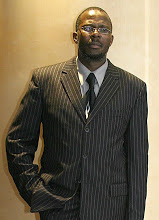For over many centuries black scholars and African people have been grappling with the the debate of defining who really qualifies to be called an "African", but to date, no common paradigm seem to be standard or prevail.
During the successive African Renaissance KZN Chapter conferences, commissioners steeped in Pan-Africanism normally devote tremondous amount of their time and energy to broadly define who should be spearheading the enormous challenges the continent was facing as it attempts to re-awaken itself as it integrate to the global political economy.
Two years ago, the eminent Pan-African scholar Ngila Muendane, argued that some African people were confused and were avoiding calling themselves 'African' but were pandering to the liberal anti-nationalism.
Muendane stressed an emphasis that as Africa re-awakens itself from the underdevelopment slumber, African intellectuals have a moral duty to 'develop a common Africanparadigm or common ethos from which to depart'.
The African Renaissance, says Muendane, could be styled to the "British character" , "American Dream" or what the Jewish people define as "Zionism".
"There are non-Africans who want to qualify as Africans, and they are welcome but should abandon identifying themselves with Europeans and must begin to embrace the African value systems.
An African to spearhead the rebirth of Africa is person who has links to this continent and identifies with Africanness because it is eternal and does not depend on shifty and meaningless things,such as skin pigmentation" explained Muendane.
And the Durban-based Cultural and Heritage activist Nhlanhla Mtaka is of the strong view that African people must firdt cement an identical and ethical culture that was underpinned by service excellence, aptly referred as Ubuntu philosophy.
"Being African is not essentially linked to colonisation and oppression but must be seen in the historical, and contemporary social, economic and cultural realities.
And we must unleash these vital factors as a powerful crusade with all our capacities to awaken the sleeping giant-our continent Mother Africa- to become a moral beacon and a powerful global player forever" noted Mtaka.
Mtaka added that it is the culture, history and attachment to these and consciousness of such identity and not skin colour that makes one an African, and he implored people to discuss issues such as identity, culture and heritage as free people who must set their own agenda ina unique miellieu accordint to their own realities.
However, that renowned African writer Ngugi wa Thiong'o has penned a book, titled 'An African Renaissance -Something Torn and New' whereby he alludes to a radical understanding of needs to be grappled by African people towards the realisation of the African Renaissance.
"Over centuries of contact with the West, Africa has suffered the deprivations of slavery, colonialism and globalisation.
An integral part of this tragic encounter has been "Europhonism" "observes wa Thiong'o.
wa Thiong'o alludes to the fact that African people started by replacing native names and language systems with Europeans ones.
Acording to him, this remains the worst tragedy ever to the African development because, he writes, 'language is a communal memory bank'.
"In loosing its native languages, Africa would loose its social meaning,ite very identity" says wa Thiong'o.
wa Thiong'o traces Africa's fragmentation and restoration amidst the global history of colonisation and modernity.
IUn seeking the revitalization of Africa, Ngugi argues, that a renaissance of African languages is a necessary step in the restoration of African wholeness.
He(Ngugi) speaks of the 'decolonisation of modernity'.
"Africans, in the Diaspora and on the continent, were soon to be the recipients of this linguistic logic of conquest,with two results.
NAgugi calls this practise as the Dismembering Practises, and is of the view that without tackling this malady, Africa is faced with serious challenges with its renewa, beacause he states Africans were "Dismembered from the land, from labour, from power, and from memory. The resultis destruction of the base from which people launch themselves into the world".
And the pertinent question remains about how do the African people develop a common paradidm and ethos that takes them into the other levelas they attempt to revitalise themselves.
Tuesday, June 23, 2009
Subscribe to:
Comments (Atom)


